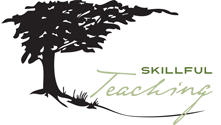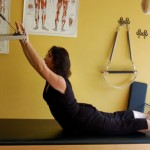Effective Language Tools For Pilates and Yoga Teachers Part 1
How often have you really considered the language you use in your teaching? I mean really considered it? In the early stages of teaching we are on an intense learning curve of learning the language of our method be it yoga, Pilates or Feldenkrais. We spend endless hours listening, unraveling, understanding and then regurgitating new language for the purposes of disseminating knowledge. But how much time did you spend refining your language after that? How often have you considered the weight, perceived meaning, tone, pace, volume and connotation of your words?
Have you noticed how it’s not only the words you use but how you use them that affects your students? Words affect us because they convey something, a meaning, but not simply the definition according to Webster. They relate back to our personal experiences,
they carry history, emotion, memory all of which is at play when you teach.
We are going to look at 4 simple elements in creating effective language when teaching over the course of the next several weeks including:
– Word choice
– Conservation of words
– Dosing of anatomical & technical terms
– Delivery – The importance of tone, pacing, clarity, and volume
* Verbal cueing techniques and suggestions we’ll save for our upcoming cueing forum because it’s a HUGE topic.*
We start with…
Word Choice
Let’s jump in and look at some examples:
Examine the difference between these word choices and see how each make you feel. Which would you choose and why?
Pull vs. Tug
Plug in vs. Draw in
Stop vs. Relax or Release
Step vs. Jump (As in step off the reformer or jump off the reformer)
Grab vs. Place
Notice vs. Look or Watch
*And vs. But
Deepen vs. Pull in
Suck in vs. Narrow or Draw in
Grip vs. Hold
Glide vs. Push
*Good vs. Perfect
Stop vs. Pause
Sniff in vs. Breath in
Exhale vs. Ex
Twist vs. Rotate or Turn
Bend vs. Fold
Lengthen vs. Stretch or Open
Compress vs. Close or Support
Your verbal cues significantly impact the quality of action you get.
I can’t say this enough.
You’re words impact, impart, inform the quality of the action your student produces! Don’t just pull a word out of a hat and accept that it’s good enough. You not only sell yourself short you leave your student in a terrible lurch, a victim of your inability to put some thought into what you say. Sometimes this is laziness, the backlash of too many hours saying the same thing or simply a lack of awareness. I think for most of us it’s a combination of all three.
As a teacher your words play a significant role in a student’s ability to truly hear and then manifest change. As a teacher of movement in particular you are responsible for evoking movement not just teaching movement, a crucial distinction.
So first, let’s look at a very interesting and overlooked word choice: the difference between using “but” or “and”. I would venture to guess that more than 50% of the time you use “but” when you mean “and”.
Tomorrow I want you to notice every time you use the word “but” and then ask yourself do you really mean “but” or do you mean “and”?
Using “but” negates whatever came before. “You did great but I want you to inhale next time.” It’s like saying you did great, but not really great because you didn’t inhale.
How would it be different if you said “You did great and next time experiment with inhaling. It will help optimize the ease in your shoulders as you straighten your legs.” Different, no? YES! Totally different.
Now, let’s look at some of the other word choices. How about the word “good”? How many times do you say good or good job or nice or nice job in a day of teaching? Almost certainly too many times. The word “good” or “nice” become totally and absolutely void after about the 5th time you say them. “Good” becomes vacant, meaningless, ambiguous and says you’re not really paying attention.
Can you be specific? I think probably, yes. Your assignment, should you choose to accept it (sorry I couldn’t resist) is to pick out how many times you use these two words or other empty fluff words without backing them up with something real.
When you say “good job releasing your shoulders, Sarah” that is something entirely different. It says you are watching and it gives your client specific, actionable, feedback. This kind of feedback is the only kind that will help them progress.
The other thing about accolades is that they should not be given lightly. If you say perfect you ought to mean perfect! What do you really mean? I would encourage you to examine for yourself that question the next time you teach and take a second to jot down what you discover.
As a starting place begin to pay attention both to how you choose your words — if you do — when you are teaching AND notice how you respond to the words other teachers use when they are teaching you or when you observe them teaching. What ruffles your feathers and why? What resonates and facilitates greater relatability between student and teacher? This will help you make better, wiser choices down the road.
You’ll be surprised at how far you get when you simple notice.


 How are you showing up? Why are you showing up? Why do you teach? What IS teaching? Why do you care? This is Skillful Teaching: A Whole-person approach to being an expert teacher, not an expert technician. There's a difference. Want to know what it is?
How are you showing up? Why are you showing up? Why do you teach? What IS teaching? Why do you care? This is Skillful Teaching: A Whole-person approach to being an expert teacher, not an expert technician. There's a difference. Want to know what it is?

Thank you for some really great points. I have been thinking recently about my choice of words and the imapct they have on my clients. This article really helped me focus on this and I will start to put into practice this afternoon!
I am so glad you found it useful, Ceri. I think it’s one of those things that we forget to even consider after we’ve been teaching for a while, but is a true part of being a masterful teacher. Please feel free to send me any specific questions you have or anything you’d like to work on in this regard. And stay tuned for the rest of parts. It’s going to be fun!
Best to you –c
I just joined this forum and I love it! I’ve always been mindful of the words I chose when Cueing, however, this forum has already helped me refined my technique. I especially love your comment on the use of and vs. but. Maybe you address this later, but how would you apply this in a group class setting – especially the comment about being specific?
Thanks for all your efforts,
Marivi
Hi Marivi!
Thanks for joining the forum. I hope you’ll consider sharing some of your favorite cues with us too! As to your question, I think the best thing you can do in terms of being specific is staying totally present with your classes and notice the quality of their movement/practice. What do you see, what’s different, are they are responding well to something you said or asked them to do? If yes, then point out their effort: for example – you just told your class to slow down and focus on their breath, they did and their execution of the exercise improved. It became smoother, better controlled etc. So, you can say “Lovely control” or “great control” or “fantastic, your movements are so much smoother.” Etc. I hope that helps. This just takes practice. Give yourself the task of tuning into the words you use when giving out compliments and work on it one class at a time. You’ll find those words and phrases that honestly reflect your personality and what you see and your students will know you’re REALLY looking! Keep up the good work!
I’m just getting started using the forum, and I love this focus on our word our choices. Our clients come from so many backgrounds when it comes to their relationship with fitness, movement, and their body in general. So when we give direction it is really important, as you mention above, to stay present and observe their physical (and maybe even emotional) reaction to the cue given. And then, adjust our verbiage as needed. Thanks Chantill for creating this forum!!
Thanks, Sarah, for being a part of the forum :)! It’s your input, insights and feedback that will continue to make this a wonderful and rich place for teachers to come to support their teaching. As always, excited to be on this journey with you!